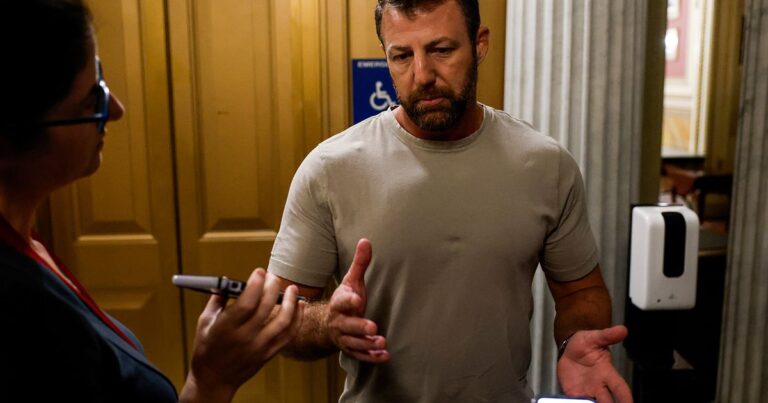Congressional dysfunction took a harmful flip this month. Within the US Home of Representatives, former Speaker Kevin McCarthy allegedly elbowed Rep. Tim Burchett within the kidney (McCarthy denied the declare). To not be outdone, Senator Markwayne Mullin challenged the president of the Worldwide Brotherhood of Teamsters union, Sean O’Brien, to a combat the place the 2 males exchanged insults.
For these inclined to consider that these infantile provocations advance the tip of the republic, please think about life in Congress within the many years earlier than the Civil Conflict. If the politicians of that period may very well be magically transported to our personal Congress, they’d in all probability roll their eyes — pondering immediately’s antics are kid’s play — and say, “Maintain my beer.”
When Congress first met in 1789, political events didn’t but exist. That modified rapidly, and by the tip of the last decade the Federalists and the Democratic-Republicans have been at one another’s throats—actually. In 1798, Rep. Matthew Lyon of Vermont, a Democratic-Republican, one thing nasty about Rep. Roger Griswold of Connecticut, a Federalist.
Griswold known as Lyon a coward in entrance of the opposite legislators. Lyon promptly spat in Griswold’s face. At this level, Griswold grabbed a hickory workers and struck Lyon 20 extra occasions. As Lyon ran from his attacker, he managed to choose up a fireplace tong and combat again. The melee would proceed for a while earlier than the gang pulled the lads aside.
Such was poisonous masculinity within the new nation. Historian Joanne Freeman, who has written two books analyzing how political partisanship on this period typically turned violent, describes these clashes as “ritualistic affairs of honor” the place males would elevate provocations in predictable, if harmful, methods.
Sometimes, disputes will start with insults and counter-insults that make the taunts of our personal time look fairly tame by comparability. As an alternative of calling somebody a “smurf,” as one lawmaker not too long ago did, politicians of the early republic favored old-school insults: “coward,” “liar,” “rascal,” “scoundrel,” and most deliciously, “pet .”
As Freeman notes, these insults “required a right away problem, for they struck on the core parts of manliness and gentility.” As soon as somebody resorted to those preventing phrases, it was fairly simple for the battle to show bodily. A surefire method to escalate: Seize your opponent’s nostril and twist it. “Nostril-tweaking” was tantamount to difficult somebody to a duel, however even nasty insults revealed in newspapers may result in lethal encounters, as Alexander Hamilton may posthumously affirm.
These disputes, whether or not deadly or not, may come up from all types of misunderstandings and rivalries, lots of them fairly trivial. The identical can’t be mentioned of the violent battles over slavery that consumed Congress from the 1830s till the beginning of the Civil Conflict. Throughout these many years, particularly the 1850s, the will to defend one’s political honor converged with what was—and stays—probably the most divisive, highly effective political challenge within the nation’s historical past.
In his analysis, Freeman has uncovered upwards of 70 completely different violent altercations between members of Congress throughout this time, both in or across the Capitol constructing. These incidents virtually invariably pitted Northerners and Southerners towards one another, with slavery the principle supply of competition.
Southern politicians more and more turned to threats of violence to advance their agenda of defending and increasing slavery. For instance, when Congress was debating the troublesome laws that may develop into often called the Compromise of 1850, Rep. Thomas Clingman and Senator Henry Foote, each of Mississippi, that they and their allies would deliver weapons into Congress and open hearth in the event that they did. do not get their means.
For the remainder of the last decade, many in Congress took to carrying weapons and knives, even conspicuously displaying the weapons to discourage potential attackers. Disputes typically erupted into outright violence, most famously when Massachusetts Senator Charles Sumner gave a speech by which he known as South Carolina Senator Andrew Butler a “noisy, squat, anonymous animal” who went with a metaphorical mistress: “The harlot , Slavery.”
The insult provoked Rep. Preston Brooks, a relative of Butler, to ambush Sumner as he answered mail at his desk. Armed with a metal-tipped cane used to self-discipline canine, Brooks beat Sumner mindless, leaving him semi-conscious in a pool of his personal blood. Henry Wilson, the second senator from Massachusetts, known as the assault “brutal, murderous and cowardly”, scary Brooks to problem Wilson to a duel. (Wilson, no shrinking violet, declined contemptuously.)
Different melees broke out over far much less, however virtually all the time traced their origins to disputes over slavery. In 1858, for instance, one other South Carolinian, Consultant Laurence Keitt, made the error of getting somewhat too near Pennsylvania Republican Galusha Develop in a heated argument over an out of order. Develop punched Keitt, instigating an epic brawl that culminated in over 50 lawmakers throwing tobacco spit at one another. Simply one other day on the workplace.
Looking back, these incidents could be learn as harbingers of the violence of the civil conflict. Nonetheless, the identical can’t be mentioned for the dangerous habits proven not too long ago. There is no such thing as a single lightning rod challenge driving the division, and it isn’t even clear that this displays the precise battle between political events.
Nonetheless, if the approaching weeks deliver information of Chuck Schumer grabbing Mitch McConnell’s nostril and calling him a pet, be afraid. Be very afraid.

